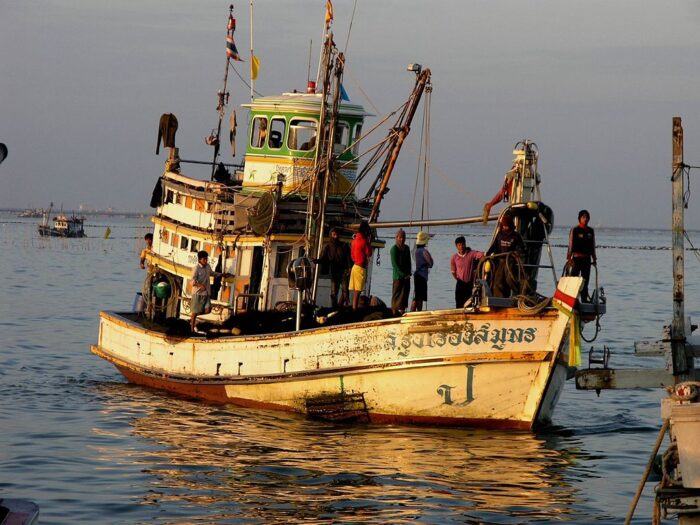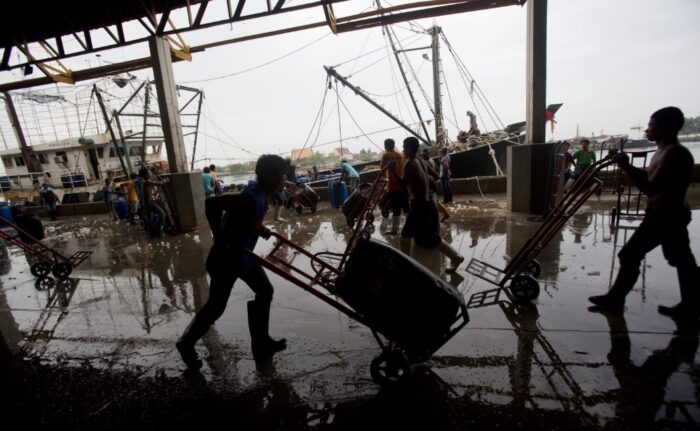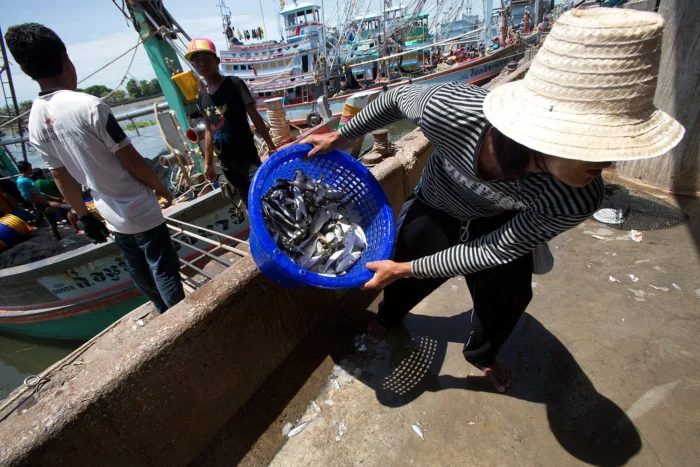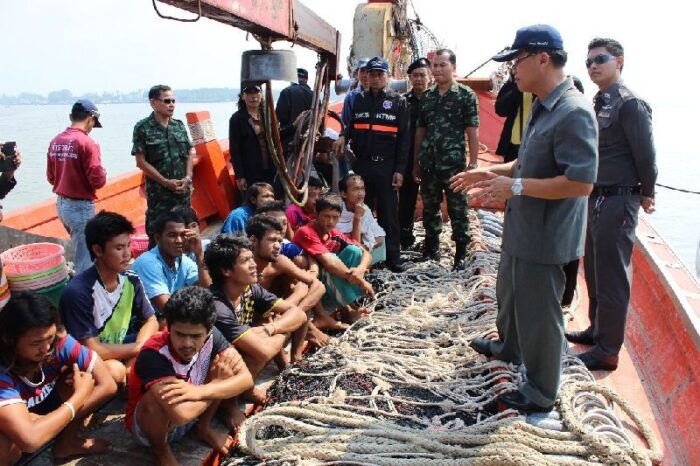
Thailand has a reputation as one of the largest fish exporters in the world. However, there is a dark truth about Thailand’s fishing industry which remains largely unknown to consumers worldwide. The Thai fishing industry exploits human trafficking victims to work aboard its boats. The operators of these fishing fleets lure the laborers to work in Thailand with false promises. Many workers are kept captive and confined in cages like prisoners. According to statistics cited by the International Labour Organization, Asia and the Pacific region has the highest number of people in forced labor at 15.1 million.
The parents of former immigration and refugee lawyer Katrina Sriranpong were Thai immigrants, so she has an affinity for the people and culture of Thailand. Advocating against human trafficking has long been a cause for her. Sriranpong was the only Thai-speaking immigration lawyer to practice in Vancouver, British Columbia, Canada, where she lives with her husband and two sons. Her fluency in the Thai language allowed her to communicate with desperate clients.
Katrina Sriranpong decided to take an indefinite leave from the practice of law to focus on her two young children. However, she did not want to retire from making extremely meaningful contributions in life. Today, she supports several international causes, which include Operation Underground Railroad (“O.U.R.”). O.U.R. connects law enforcement and government agencies in 40 countries to fight human trafficking. “Since my family is from Thailand, I have a significant interest in supporting organizations that aim to raise awareness on the issue of human trafficking, especially of children for sexual exploitation or forced labour,” Sriranpong says.
Inhumane Treatment and Forced Labour

Forced labour, a form of human trafficking, is a widespread violation of human rights. It remains one of the most complex challenges facing leaders internationally. Beyond fishing boats, traffickers force captive labourers to work under inhumane conditions in factories, hotels, massage parlors, mines, or drug-trafficking networks.
Journalists and human rights defenders turned the spotlight on Thailand’s fishing industry in 2014 and 2015 after reports of slavery gained traction. The Associated Press’s team of journalists discovered that boat operators ensnared and trapped the labourers — poverty-stricken migrants from Myanmar, Cambodia, Laos, and Thailand — then locked them up and physically beat them, forcing them to work.
The Associated Press reporters were shown a graveyard where more than 60 workers had been buried under false names. Other reports in January 2018 determined that some workers died or suffered beatings.
The International Labor Organization states, “Fishers are forced to work for long hours at very low pay, and the work is intense, hazardous, and difficult. Capture fisheries have one of the highest occupational fatality rates in the world.”

Migrant workers risk being deceived or coerced to work aboard ships under the threat of violence or debt bondage. Traffickers target vulnerable populations, such as individuals lacking lawful immigration status, those in debt, disabled people, and those who cannot speak languages beyond their own country.
Katrina Sriranpong explains that “Thai fishing boats are under-reported by authorities, which leads to concern that many fishermen are being financially exploited. There have been reports that human trafficking victims in the Thai fishing industry have been forced to work for 18 to 20 hours per day with very little food or water. They are provided with no medical supplies and are forced to work at sea for months or even years without seeing their family. Some victims are sold and others are deceived to work aboard the ships. The isolation at sea for extended periods of time means that victims are unable to contact authorities or family for help. Also, as an immigration and refugee lawyer, I’ve found that human trafficking victims often do not know their rights and how to navigate the landscape of law and resources available to support them.”
Harrowing Accounts of Slavery at Sea on Thailand’s Fishing Boats

In 2018, Human Rights Watch filed a 134-page report based on research carried out in every major Thai fishing port from 2015 to 2017. The report revealed disturbing details of forced labor on Thai fishing vessels. The report described workers performing backbreaking work without pay, as Burmese migrant, Saw Win, did for three months before he was sold to another boat. He said the ship’s operator regularly beat the crew members with an iron bar and threatened them at gunpoint. Before Win was sold to yet another boat, at least one forced laborer was thrown overboard and drowned. On the next boat, Win witnessed the person in charge of the ship strangle a worker to death after he had allegedly ripped a fishing net. Saw Win eventually jump overboard to seek help.
Another victim of human trafficking, Vannak Anan Prum, described his ordeal in his memoir. Vannak was“smuggled across the border from Cambodia into Thailand, Vannak was hoping to work to support his wife who was pregnant with their first child. Hidden in the back of a pick-up truck, they drove for hours. When the truck finally stopped, Vannak was taken to a house and locked in a room with several young Cambodian men. It was then he realized that something was terribly wrong. The following morning, Vannak was led to a fishing trawler. The men were told to hide as the boat left the port towards the South China Sea. After an hour, they were told to get up. “I asked a Cambodian man when I would go home. He answered with a question, ‘Did you pay to get here?’ I said no, and he said, ‘Well, stop asking questions. You have been sold.” Vannak soon learned that several of the men had been on board the vessel for years. He was still unaware that it would be almost four years before he was able to escape the daily abuse, violence, and exploitation of this trafficked ordeal.”
The report, Caught at Sea: Forced Labour and Trafficking in Fisheries, revealed, “Victims describe illness, physical injury, psychological and sexual abuse, deaths, and their vulnerability on board vessels in remote locations of the sea for months and years at a time.”

Forced labor typically occurs in societies where the rule of law is weak or where corruption is widespread, according to antislavery.org. It tends to be the most vulnerable and excluded societal groups that become victims of this insidious crime.
Katrina Sriranpong urges people to become aware and support organizations working to end the financial exploitation of migrant workers on Thai fishing vessels. Sriranpong says, “Thailand’s fishing industry relies heavily on slave labor and illegal fishing. And, consumers are unknowingly eating products that are contaminated with slavery and corruption. I think demanding greater transparency in the seafood supply chain is key to ending slavery at the sea. It requires a collective effort in order to unravel the criminal organizations involved in trading human life.”








